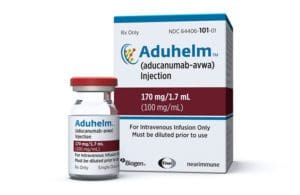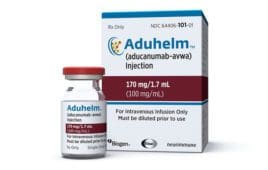 The backlash surrounding aducanumab post-approval has put Biogen (NSDQ:BIIB) on the defensive, prompting the company’s head of research and development, Dr. Alfred Sandrock, to post an open letter to the Alzheimer’s disease community on Biogen’s website. In the letter, Sandrock lamented that there was “extensive misinformation and misunderstanding” regarding the drug.
The backlash surrounding aducanumab post-approval has put Biogen (NSDQ:BIIB) on the defensive, prompting the company’s head of research and development, Dr. Alfred Sandrock, to post an open letter to the Alzheimer’s disease community on Biogen’s website. In the letter, Sandrock lamented that there was “extensive misinformation and misunderstanding” regarding the drug.
In recent weeks, the company also requested that the FDA narrow the indication for the drug to focus on Alzheimer’s patients with mild cognitive impairment or mild dementia. The FDA had initially indicated it for all Alzheimer’s patients even though clinical trials focused on patients with milder forms of the disease.
The collaboration between FDA staff and Biogen
FDA closely worked with Biogen during the approval process of aducanumab. Critics such as Public Citizen have called the cooperation between the two organizations “unprecedented” and “inappropriately close.”
FDA had viewed data from two major clinical trials that had been terminated early before submission for at least several months before Biogen applied for approval of the drug. According to STAT, Biogen used an FDA back-channel involving off-the-record meetings to coax the agency into backing the drug.
The STAT article maintains that Biogen and FDA worked collaboratively over three months. “Assuming that’s true, I believe that’s unprecedented, but maybe I’m wrong,” said Dr. Michael Carome, director of the health research group at Public Citizen. “Maybe this has been going on before with other companies, and we just don’t know, but I don’t think so.”
Public Citizen has asked the Inspector General’s Office to investigate the nature of collaboration between FDA and Biogen.
Biogen has denied wrongdoing. In his recent letter, Sandrock said the company welcomes “a formal review into the interactions between the FDA and Biogen on the path to the approval of aducanumab.”
Public Citizen has also criticized FDA’s decision to coauthor a report with Biogen in advance of the Peripheral and Central Nervous System Drugs Advisory Committee Meeting in November 2020. The report had alternating sections comparing the “applicant’s position” with “The FDA’s position.”
“In our experience, over many, many years attending and in some cases participating in advisory committee meetings, we had never seen such a joint briefing document,” Carome said.
Typically, for an advisory committee meeting, there are two briefing documents. The applicant whose product is coming before the committee for review writes one, and the FDA writes another. As a result, the FDA’s briefing reports tend to be “more objective and balanced” than applicants’ reports. “Often, [an FDA briefing report is] in conflict in varying degrees with statements and assessments made in the sponsor’s briefing document,” Carome said.
Biogen apparently wrote the majority of the briefing document for aducanumab, which was interspersed with text boxes including FDA staff opinion. “Overall, it was a very one-sided document — typical of a briefing document written by a sponsor,” Carome said. “It was really a biased assessment of the drug, overemphasizing the small amounts of positive data that the drug might have some benefit and trying to discount the overwhelming negative data.”
The nature of the advisory committee meeting
The Peripheral and Central Nervous System Drugs Advisory Committee Meeting members were nearly unanimous in rejecting aducanumab in the absence of further data. “There is a suggestion of a [positive] effect,” said Dr. Aaron Kesselheim, then a member of the FDA Peripheral and Central Nervous System Advisory Committee. But the trial “doesn’t add up to be strong evidence,” he concluded.
Following the FDA approval of the drug, Kesselheim and two other members of the committee have resigned.
But the meeting itself was unusual, Carome surmised. While the COVID-19 pandemic has forced such meetings to be virtual, it was uncommon for the agency to include pre-recorded presentations rather than have speakers available in real-time. “For this meeting, there was only one FDA speaker, and that was Dr. Billy Dunn,” Carome said. “In his presentation, Dunn sounded more like a consultant that had been hired to speak on behalf of the company rather than an objective, unbiased, federal regulator,” Carome said.
Dunn and two FDA colleagues asserted in The Washington Post that the agency approved the drug based on rigorous science.
The use of the accelerated review pathway
Before aducanumab, no other Alzheimer’s disease drug has won FDA approval under the accelerated approval pathway.
Biogen points out, however, that FDA has granted accelerated approval status to more than 250 drugs.
FDA created the program in 1992 to permit approval of drugs targeting serious conditions and unmet needs based on a surrogate endpoint that promises to predict a clinical outcome.
Aducanumab clearly reduces amyloid-beta plaques in the brain. But the use of such plaque removal as a surrogate biomarker is controversial. “The data we have today says otherwise, including data from the trials of this very drug,” Carome said. “So that’s another sort of aspect that’s unprecedented.”
One wrinkle is that the ability to measure amyloid in the brain before death is a relatively novel breakthrough. Thus, PET scans were not feasible to detect beta-amyloid levels for many clinical trials in the past. “We do know that since [PET] scanning [for beta amyloid] became available, there have been other drugs tested that either stopped the accumulation of or in some cases reduced beta-amyloid in the brain,” Carome noted. “But there was no benefit in terms of cognitive measures.”
In 2019, Biogen and its partner Eisai announced they would halt their aducanumab trials after an interim analysis that predicted that the Phase 3 EMERGE and ENGAGE clinical trials would miss their primary endpoint. But the companies changed their mind after performing a post hoc analysis.
Post hoc analyses are “highly subject to bias,” Carome said. “You shouldn’t make any definitive conclusions on them.”
A posthoc analysis of the EMERGE clinical trial was positive, while the ENGAGE trial wasn’t. “It’s highly likely this slightly positive result [in the EMERGE TRIAL] at one dose was a false positive, particularly when you put that into the context of all the other [Alzheimer’s] drugs that have failed and the data from this [EMERGE] trial,” Carome said.
Filed Under: Neurological Disease



